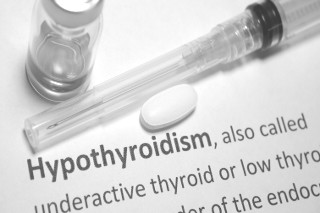 The thyroid gland is a powerful structure found in the lower neck and regulated by the pituitary gland that secretes hormones that affect metabolism, a process that controls how efficiently cells are able to convert nutrients into energy. That being said, the thyroid affects every muscle, bone, and organ in the body. Because the thyroid is responsible for producing energy, underactive thyroids may cause other bodily processes to slow. The slowing of certain bodily processes can have a profound influence on mood and mental well-being.
The thyroid gland is a powerful structure found in the lower neck and regulated by the pituitary gland that secretes hormones that affect metabolism, a process that controls how efficiently cells are able to convert nutrients into energy. That being said, the thyroid affects every muscle, bone, and organ in the body. Because the thyroid is responsible for producing energy, underactive thyroids may cause other bodily processes to slow. The slowing of certain bodily processes can have a profound influence on mood and mental well-being.
Thyroid Disorders and Mental Health
In general, it has been found that people with thyroid disorders are more likely to develop depression than those without and that depression may be accompanied by slight thyroid abnormalities.3 Hypothyroidism occurs when the thyroid is underactive, or does not produce adequate thyroid hormones required for normal bodily functioning, and is estimated to affect approximately 10 million Americans. The condition increases in prevalence with age and women are more vulnerable to the condition than men are2; in fact, as many as one in five women will develop the condition by the time they are 60 years old. Evidence has suggested that unsatisfactory levels of thyroid function is associated with an increased vulnerability to the development of depressive symptoms and serves as a risk factor for depressive symptoms in females.4 Hyperthyroidism, on the other hand exists when the thyroid is overactive, producing a excessive amount of thyroid hormones.
Hypothyroidism and depression share a number of symptoms. For example, individuals with either disorder may experience depressed mood, fatigue, reduced sexual desire, trouble concentrating and/or weight gain. However, there are several key features that distinguish hypothyroidism from depression. Symptoms of chills, constipation, muscle cramps, dry skin, hair loss, and/or slowed heart rate are typically experienced by individuals with thyroid imbalances. Because of overlapping symptoms, individuals suffering from hypothyroidism may be misdiagnosed with depression, leading to prescription of antidepressants rather than thyroid medication. While a bulk of the existing literature focuses on the link between hypothyroidism and depression, it is similarly true that hyperthyroidism can affect one’s mental health. Individuals with hyperthyroidism experience difficulty with fluctuating mood, anxiety, difficulty sleeping and problems with appetite – with anxiety being the most widely recognized.
It is important to understand that the symptoms of underlying medical conditions may mimic those of certain mental health conditions, a thyroid disorder is one type of condition for which this reigns true. While it is easy to assume symptoms of emotional instability or depressed mood are due to the existence of psychological disorders, it is critical to first rule out other potential causes. The current practice guidelines suggest that tests for thyroid functioning should be conducted when adults present with depressive symptoms, however, additional research to clarify the relationship between thyroid functioning and mental health should be conducted to support this recommendation and extend it to apply to symptoms of anxiety as well.1
1. Almeida, Alfonso, Flicker, Hankey, Chubb, & Yeap. (2011). Thyroid Hormones and Depression: The Health In Men Study. The American Journal of Geriatric Psychiatry, 19(9), 763-770.
2. Fuller-Thomson, E., Saini, J., & Brennenstuhl, S. (2012). The association between depression and thyroid disorders in a regionally representative Canadian sample. Psychology, Health & Medicine, 17(3), 335-345.
3. Hage, M., & Azar, S. (2012). The Link between Thyroid Function and Depression. Journal of Thyroid Research, 2012(2012), 8.
4. Kim, Eun Young, Kim, Se Hyun, Rhee, Sang Jin, Huh, Iksoo, Ha, Kyooseob, Kim, Jayoun, . . . Ahn, Yong Min. (2015). Relationship between thyroid-stimulating hormone levels and risk of depression among the general population with normal free T4 levels. Psychoneuroendocrinology, 58, 114-119.
by Callie Patterson
Callie Patterson is a graduate student pursuing a degree in psychological sciences at Northern Arizona University.
The content on this website is not intended to be a substitute for professional medical advice, diagnosis, or treatment. Always seek the advice of your physician or other qualified health provider with any questions you may have regarding a medical condition.





